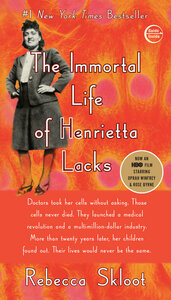Take a photo of a barcode or cover
informative
reflective
medium-paced
emotional
informative
sad
medium-paced
I will never forget this book as long as I live. It reads like a dystopian fiction novel in so many ways, but knowing that all of it is true had me gasping, tearing up, & getting angry, sometimes all at the same time.
In The Immortal Life of Henrietta Lacks, the story uncovers how cells taken from Henrietta Lacks, an African American woman who died of cancer in 1951, became the first immortal human cell line, known as HeLa, revolutionizing medical research. Skloot intertwines the scientific significance of HeLa cells with the personal story of Henrietta and her family, who were largely unaware of the cells’ use for decades. The book explores ethical issues in medical research, race, consent, and the human impact behind scientific breakthroughs.
Again, how did I not learn this in years of biology classes?!!
challenging
dark
emotional
hopeful
informative
inspiring
reflective
sad
medium-paced
A terrific and deeply important story, written with incredible care and a lot of heart. For the whole time while reading this book, I kept thinking how far science and research has come in terms of consent since Henrietta Lacks' death, and also incredibly, how much more there is to be done. It is truly bewildering to think how hard won this ability to consent is. Deborah Lacks' struggle to get recognition for her mother's sacrifice and the warmth with which she speaks is truly inspiring. The family's suffering, especially some members such as Deborah and Zakariah is really heartbreaking. Deborah's suspicions about the intentions of the author are believable because of the all her experiences until then, and the author has taken great care of her feelings. Skloot should be truly proud of this remarkable work.
The only note I have is about the accents that the White narrator of the book takes on. It feels unnecessary and icky. The producer should have considered a Black person from the South for those parts, as it felt quite jarring and uncomfortable to have a White person say the n-word.
The only note I have is about the accents that the White narrator of the book takes on. It feels unnecessary and icky. The producer should have considered a Black person from the South for those parts, as it felt quite jarring and uncomfortable to have a White person say the n-word.
adventurous
challenging
dark
emotional
inspiring
reflective
sad
medium-paced
Astonishing. I knew the basic story of HeLa but did not expect the story of her descendants to be so compelling and heartbreaking. It’s the details here that will really stick with me.
challenging
informative
reflective
slow-paced
I thought this was a fabulous book! So much to think about with no easy answers. I love that the story is told both scientifically/objectively and emotionally. I agree with some of the other reviewers that maybe too much time was spent on Deborah, however I don't think I would have fully appreciated her experience and point-of-view without the detail.
I also really enjoyed the bonus interview with Rebecca Skloot in this audio edition.
I also really enjoyed the bonus interview with Rebecca Skloot in this audio edition.
There were parts of this book that I really enjoyed and the mix of scientific perspective alongside personal narrative, I felt, worked fairly well. The book tries to confront itself frequently and objectively about what it means for a white person to be telling this story and that there will always be a distance there. In my opinion, it only partially succeeds.
This is an incredible piece of nonfiction. The author, Rebecca Skloot, is honest and transparent about her role and background as a white, Jewish woman telling the story of a Black woman. Skloot in her writing really brings to life the Lacks family and, through them, brings Henrietta Lacks to life. The focus is unequivocally on Henrietta and her descendants.
Skloot also paints the lengthy scientific picture of cell research, patents, and the changing landscape of consent in a way that is captivating and approachable to a wide audience, even diving into the current discussion of consent and tissue rights in her afterword. It shows what happened, why this is important, and where the ongoing discussions may lead.
This book is very upfront in discussing and explaining the scientific research and its relationship to racism. There would be no way to tell Henrietta Lacks' story without honestly telling the tragic history of science using and abusing Black communities. To remind readers the extent to which this was done, and why that makes it even more important that Henrietta get the recognition that she deserves.
I finally sat down to read "The Immortal Life of Henrietta Lacks" in the year 2020. Current events have made this book an even more potent reading experience, and really shows how much I still have to learn.
This book truly reads like a novel and is a book I consider a must read.
Skloot also paints the lengthy scientific picture of cell research, patents, and the changing landscape of consent in a way that is captivating and approachable to a wide audience, even diving into the current discussion of consent and tissue rights in her afterword. It shows what happened, why this is important, and where the ongoing discussions may lead.
This book is very upfront in discussing and explaining the scientific research and its relationship to racism. There would be no way to tell Henrietta Lacks' story without honestly telling the tragic history of science using and abusing Black communities. To remind readers the extent to which this was done, and why that makes it even more important that Henrietta get the recognition that she deserves.
I finally sat down to read "The Immortal Life of Henrietta Lacks" in the year 2020. Current events have made this book an even more potent reading experience, and really shows how much I still have to learn.
This book truly reads like a novel and is a book I consider a must read.
challenging
dark
emotional
informative
slow-paced




